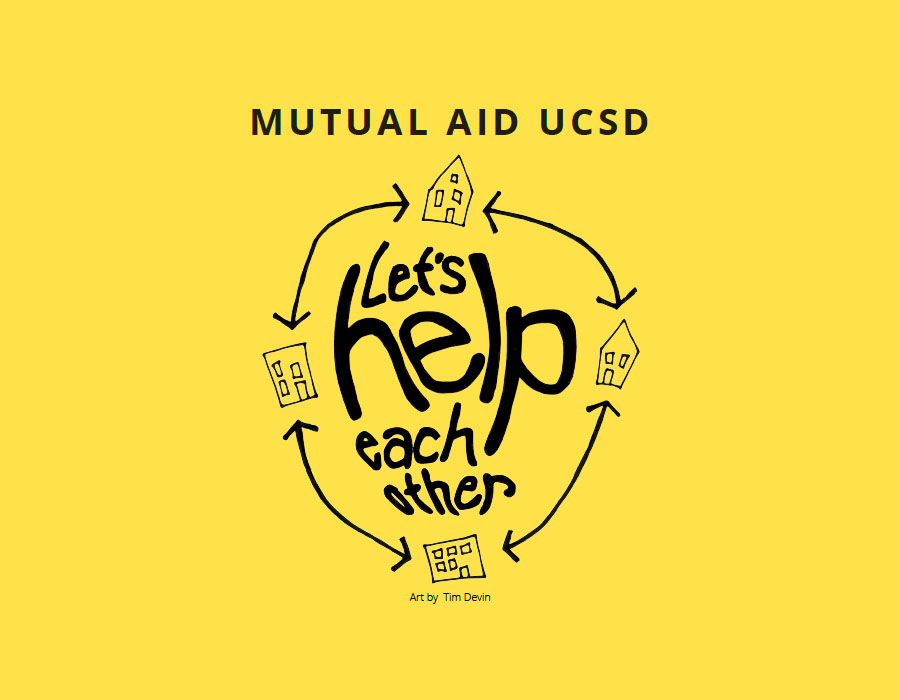COVID-19 has further exposed and exacerbated structural inequalities. But instead of relying on uneven government relief efforts to improve things, people across the country are organizing mutual aid networks to lift each other up. Students at UC San Diego have taken on this responsibility of caring for each other and have organized their own mutual aid network to help UCSD community members seeking COVID relief.
Mutual Aid UCSD traces its beginnings back to winter quarter, when a group of UCSD graduate students first organized to provide a safety net for graduate students participating in the Cost of Living Adjustment movement. Once COVID-19 hit, Mutual Aid UCSD decided to maintain itself as an autonomous, student-run collective. It now organizes outside of COLA to provide basic needs for UCSD faculty, students, and staff disproportionately affected by COVID-19.
The term “mutual aid” refers to self-organized volunteer efforts to redistribute resources more equitably within a community. Mutual aid is distinct from charity; while charity is vertical and flows from top to bottom, mutual aid is horizontal— it’s symbiotic, self-organized, and focused on changing the structures that created inequality in the first place.
Mutual aid has historical roots as a grassroots organizing method during the ‘60s and ‘70s. Prominent examples can be seen in The Black Panther Party, which led a free-breakfast program for children in impoverished areas, and the Street Transvestite Action Revolutionaries, led by transgender revolutionaries Marsha P. Johnson and Sylvia Rivera, to support homeless trans youth in New York. Mutual aid efforts are now resurfacing in the coronavirus era.
The philosophy of mutual aid holds that no struggle is completely independent or mutually exclusive from any other, and COVID-19 is interwoven with other social, political, and economic structural inequalities.
“COVID-19 affects certain people differently,” Eleanor Roosevelt College junior and Mutual Aid UCSD member Grayson Sims explained. “In particular, people of color, Black people, and Indigenous people. And so we want to stick together.”
According to the Centers for Disease Control and Prevention, COVID-19 has a disproportionately large impact on racial and ethnic minority groups. In addition, the university’s transition to Zoom has made differences in privilege and circumstance even more apparent. For example, some students face unique obstacles in accessing computers and Wi-Fi. Other students are facing financial hardship and struggling to gain employment. Many students have moved back home, and some live in highly affected areas with unequal access to food, healthcare, and other resources. These CDC says these socioeconomic conditions are more common among racial and ethnic minority communities than among white communities.
Nearly all of the 14 Mutual Aid UCSD core organizers identify as Black, Indigenous, and POC students themselves. As members of underserved communities that already face unique challenges in navigating a historically white institution, Mutual Aid UCSD works to provide community support outside of the university, the collective told The UCSD Guardian.
Because mutual aid philosophy encourages existence independently of institutions, Mutual Aid UCSD has partnered with independent co-ops on campus to organize joint programming. For example, the Food Co-op has donated extra food to Mutual Aid UCSD. Mutual Aid UCSD is also collaborating with Groundworks Books to host reading groups about social issues and build community about the philosophy of mutual aid.
Mutual Aid UCSD also organizes weekly social check-ins via Zoom to discuss social issues, mental health, and come together as a UCSD community. The social check-ins provide a safe space for UCSD community members to reflect on their positions in the world.
“I think the emphasis is on self care,” Sims said. “Especially amidst all of this ongoing police brutality going on. We do have discussions on it, specifically for people who just want a space to talk about it.”
By taking time to reflect and heal at these social check-ins, community members stand up for themselves and insist that they deserve support in a world historically structured against them. This revolutionary idea can be traced to the black lesbian activist Audre Lorde, who once said, of her in her fight for social justice, in the ‘80s, “Caring for myself is not self-indulgence, it is self-preservation, and that is an act of political warfare.” The practice of self-care has historically served as a gesture of defiance against racist and oppressive systems, and Mutual Aid UCSD considers it a critical component of their activism. These social check-ins offer a space for emotional healing and education on allyship, especially for Black Lives Matter.
“We believe an important part of mutual aid, especially with the pandemic of police brutality, is to be allies, to use our privilege to call out anti-Blackness in our communities, and stand with the voices of Black people,” the collective said.
So far, Mutual Aid UCSD has collected $4,903 in donations. It has disbursed $2,550 to 20 different UCSD community members with financial needs, and is currently in the process of disbursing the rest. In addition, more than 80 volunteers have signed up to deliver food and supplies to those in need.
Those interested UCSD community members can get involved by donating, attending weekly social check-ins, and signing up to volunteer or organize. People can also sign up here to request aid. Mutual Aid UCSD’s list of Black Lives Matter resources can be accessed here.
For more information, visit @mutualaiducsd on Instagram/Twitter/Facebook.
Photo courtesy of Mutual Aid UCSD.







